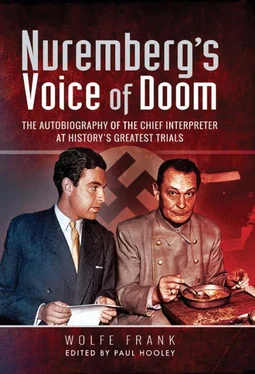There then arrived a letter from Sykes who was busy making big deals in Florida, telling me that his American friends were offering me a job over there and that they were expecting me to arrive sometime during 1939. Humphrey however had some misgivings with regard to my German nationality, there was going to be some considerable involvement of the US Government in Canaveral and Humphrey felt it best that I did not turn up there as a German! I had already tried, and failed, to find some trace of my father’s British citizenship; although I did discover he and my mother had been married in England.
‘You will be better off as a stateless person,’ said Humphrey in his letter, ‘and I have found out that there is a way to accelerate the cancellation of your German citizenship. You can, so I am told, work it by abusing the German Government on German soil. In other words, go and insult Hitler in the German Embassy in London. But you’d better contact… first, he’s a high-ranking official in Scotland Yard and is a good friend of mine. Perhaps he’ll take the necessary steps to prevent the Germans from becoming a nuisance.’
Up until that time I had heard nothing about the loss of my German citizenship from Germany, although this would certainly follow in the case of anyone who had ‘quit’ the Third Reich under a self-made cloud. However, there were so many of us the Reichsanzeiger (the official gazette) was lagging behind in publishing names – a necessary prerequisite for being ‘ ausgebuergert ’ (de-citizenized.)
I had heard from a lawyer friend in Germany that all my traceable assets had been confiscated and that the money my father had left to me in trust had been blocked. That money vanished together with the executor, a Jewish Berlin lawyer. No trace was ever found of either him or the capital, consequently my debts exceeded my assets. I could not have cared less. (Many years later Maditta told me that she had been forced to pay some of my debts, but it was really her father the Baron’s money and she considered the losses to be a minor evil in the face of everything else that had been done to us.)
My lawyer also warned that I would be declared, ‘Hostile to, and an enemy of, the National Socialist German Reich’ – a bad blow which I would manage to overcome.
So, Sykes’ ‘abusive’ scheme was to be put in operation. The Scotland Yard man opined that I wouldn’t need his help, ‘After all,’ he explained, ‘they could hardly spirit you out of the German Embassy and England.’ As a matter of fact, the whole thing went off very nicely.
I went to Ribbentrop’s Embassy in Carlton Terrace and demanded to see the Chief of the Passport Section. I believe his name was Dr Kraft. I had to convince a receptionist of the highly important and confidential nature of my business before I was allowed to enter the office of the Herr Doctor.
Adolf’s portrait was hanging over a huge desk in the large and exquisitely furnished office. Kraft was a man in his late forties with a duelling scar [2] A duelling scar or ‘bragging scar’ was seen amongst upper-class Germans and Austrians, especially those involved in academic fencing, as being a ‘badge of honour’ that emphasized one’s class and status in society. German military laws permitted men to wage duels of honour until World War I, and in 1933 the Nazis legalized the practice once more.
across his face and he had a typical Prussian square skull.
‘Heil Hitler,’ he said.
‘ Quatsch ’ (best translated as bullshit) said I. Lord Birkenhead had put it more elegantly by calling it ‘plural, and they bounce.’ Kraft thought he hadn’t heard right. I didn’t repeat myself but said: ‘Don’t you Heil Hitler me. I’ll tell you what I think of your blasted Fuehrer’.
Kraft was absolutely speechless. His face was turning purple and he displayed a very nasty expression while I rattled off a list of adjectives for his Fuehrer – all of which are unprintable.
As the Fuehrer looked down on his faithful servant, I gave the thing a finishing touch. I walked around Kraft and spat in Adolf’s face. ‘ Nazi Schwein’ I said, running out of adjectives and imagination. I then got out of there fast. Kraft hadn’t said a single word but now he started shouting, ‘Stay here – dableiben ! (you, come back here!)’ – I could hear him roar as I reached sunlit Carlton Terrace. Oddly enough, a police constable on the opposite pavement, upon sighting me, turned on his heel and went ‘off’ like Ogden Nash’s Glow-worm, ‘to an appointment in somebody’s ointment’, now that he was not needed in Dr Kraft’s!
The scheme worked. Forty-eight hours later I received a registered letter from the German Embassy. It said: ‘You are deprived of your German citizenship with immediate effect. Your passport is confiscated. You will return it to this office forthwith’. I reported the matter to the British Home Office and on 12 May 1938, the Reichsanzeiger published my name as that of an individual, ‘Hostile to, and an enemy of, the National Socialist German Reich.’

14. THE IMPRESARIO
THE HOME OFFICE SUPPLIED ME WITH a harmonica-like structure document entitled, ‘Certificate of Identity’ in lieu of a passport. It was not a very satisfactory document and I needed a visa for every country I wanted to visit. Switzerland even required a deposit of £100 before they would issue a visa.
The certificate gave me a feeling of being a second-class human being every time I crossed a border and there was always a great deal of questioning about the length of my proposed stay. No country was in the least bit ready to admit someone they could not get rid of, if ever that person chose to stay. I could not, of course, be deported to my own country, since I didn’t have one.
The Home Office never admitted that I was ‘stateless’. Later, when I joined the Army, it turned out that the War Office, for reasons on which I will elaborate, did. Whenever I registered at hotels during the war, I ought to have put ‘German’ in the ‘nationality’ column although I wore the King’s uniform, I didn’t. I put ‘stateless’. However, a friend of mine, who was in exactly the same position, did enter ‘German’ on his registration form in an Edinburgh Hotel. The ancient porter, who had probably returned to his desk from retirement when war broke out, looked at this for a moment. ‘Just one minute, Sir’, he said. The young corporal sat down and waited. A short time later, the riot squad arrived and arrested him. The old porter had ‘phoned them with the startling news that a German soldier had just registered, and they came to grab the spy.
Of course, when I had called on Dr Kraft in 1938, I did not think of myself as a British soldier. I was thinking only of a journey to sunny Florida and a job at Cape Canaveral. Once there, I thought, I would apply for American citizenship and, when war came, I would be assigned to something where I could use what I had learned. I was, quite utterly, wrong.
Two events occurred at this point which constitute indelible and treasured memories. I became a theatrical producer briefly and, in so doing, met the most enchanting person ever. I should have hung on to her and didn’t, which ranks me high amongst the proverbial fools born every minute.
Humphrey had a cousin, the Honorable Jock Skeffington, [1] John Clotworthy Talbot Foster Whyte-Melville-Skeffington, 13th Viscount Massereene and 6th Viscount Ferrard (1914–1992) was a politician and landowner. He succeeded his father in 1956 and regularly attended the House of Lords.
later Lord Massereene and Ferrard, to whom he had lent money that was never to be repaid (this was the incident that had resulted in the take-over of the sand-pit). Skeffington was stony broke and one day I was having lunch with Humphrey and found him distraught. He told me ‘Cousin Jock’ – Humphrey’s mother, Lady Constance, and Skeffington’s father were brother and sister – ‘needed more money’. He had bought the English performing rights, for an operetta by Hungarian composer Emmerich Kálmán. The operetta was called Countess Maritza . It was, so Skeffington had been assured, a huge success on the continent of Europe.
Читать дальше













